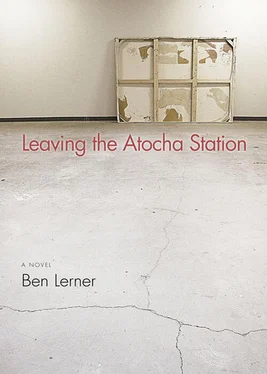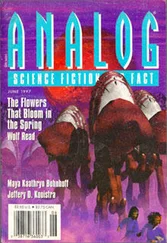Poor boy, poor boy, Teresa said, embracing me, and I let my head rest on her shoulder, careful to touch her skin where my face was wet; her skin was warm, almost hot. At first I felt something like accomplishment at my performance and excitement at the contact with her body but this quickly gave way to a sinking feeling as I began to imagine my mom, how she would feel if she knew what I had done, my self-disgust giving way in turn to the fear that somehow this lie would have material effects, would kill her, or at least that, when something did in fact happen to my mother, as happen it must, I would always feel and be at least in part responsible, that whatever she suffered would be traceable in some important sense to this exact moment when I traded her life for the sympathy of an attractive stranger. I began to cry, both arms around Teresa now, real tears falling down her back as she hummed to comfort me, maybe believing me only then. When my tears subsided, we both sat down and looked out over the slope in silence. She lit a cigarette and passed it to me and began to speak.
She described the death of her father when she was a little girl, or how the death of her father turns her back into a little girl whenever she thinks of it; he had been young when he died but seemed old to her now, or he had been old when he died but in her memories grew younger. She began to quote the clichés people had offered her about what time would do, how he was in a better place, or maybe she was just offering these clichés to me without irony; then she began to talk about how Arturo had taken it, so I guessed he was her brother, about describing heaven to Arturo, how daddy was in heaven, so I guessed that he was younger. The father had been either a famous painter or collector of paintings and she had either become a painter to impress him or quit painting because she couldn’t deal with the pressure of his example or because he was such an asshole, although here I was basically guessing; all I knew was painting was mentioned with some bitterness or regret. Then without a transition or with a transition I missed she was talking about her travels in Europe and then I heard her say New York and college and she paused and as she paused my breath caught because I realized what was coming.
In fluent English she described how one night she went alone to a movie somewhere in the Village, a boring movie, she couldn’t even remember which, but when she left the movie and was debating whether to take a train or a cab back uptown the full reality of her father’s death, it had been around a year, was suddenly and for the first time upon her, and she began to cry and found a pay phone and called her mother and cried and cried and eventually her calling card ran out and she went and bought another from a kiosk and returned to the phone and called her mother and cried into the phone until the second calling card ran out. She said she often wondered if that pay phone was still there, now that everyone uses cell phones, and then faced me smiling and said that when I was back home in New York I could look for it and if it was still there I could buy a calling card and call her and we could cry together for my mom.
I THOUGHT I HAD MADE IT CLEAR TO ARTURO OVER THE COURSE OF several conversations that I would not read, that I would be happy to come to the reading, but only to listen, not that I’d understand much of what I was hearing, and while I was very flattered that he wanted to attempt translations of my poetry, I was too shy and ambivalent about my “work” in its current state to read with his accompaniment at the gallery. I was embarrassed I’d given in to his repeated requests to see my writing in the first place, writing that I’d photocopied for him out of my notebook, and which I assumed he read with Teresa’s help, as his English was terrible, just a smattering of phrases. But when he picked me up and saw me empty-handed, he told me to hurry and get my poems, that we were already late, and he was so insistent that I found myself running back up the stairs, thinking maybe he just needed to make another copy, and I grabbed my notebook and bag, and then reiterated as we drove toward the gallery that I wasn’t going to read; claro, he kept saying, which means sure.
It was getting cold; I had somehow never thought Madrid would have a winter, but I was sweating, no doubt visibly, as Arturo greeted and introduced me to the shivering smokers milling around the gallery’s glass doors. I was too nervous to catch the names of the people with whom I exchanged handshakes, but I was aware that my kissing was particularly awkward, that I had kissed one of the women on the corner of her mouth, more on her lips than on her cheek. This was a common occurrence; with a handful of clumsy exceptions when I had met particularly cosmopolitan New Yorkers one kiss on the right cheek, and various relatives when I was a child, I had almost never, prior to my project, kissed a woman with whom I was not romantically involved. I wasn’t exactly sure what would have happened if I’d tried to greet a woman by kissing her in Topeka; certainly her boyfriend would kick in my teeth if she had one, or I would be at risk of becoming her boyfriend if she didn’t. It often occurred to me that my upbringing would have been changed beyond all recognition if kissing had been common; such a dispersion of the erotic into general social circulation would have had unpredictable effects. In Providence I could have gotten away with it, but not without an air of affectation and effeminacy; regardless, I had never thought to try. But in Spain I was guilty of abusing the kissing thing, or of at least investing it with a libidinal charge it wasn’t supposed to contain, and when you were drunk or high and foreign, you could reasonably slip up and catch the corner of the mouth.
We entered the gallery and I saw Teresa and Rafa, Arturo’s boyfriend, standing next to a table with tapas and wine. I was heading in their direction, considering breaking my rule and speaking English to Teresa, asking her to explain to Arturo that I would not read and why, when I recognized, to my horror and surprise, María José from the foundation among the people perusing the gallery walls, which featured glossy black-and-white photographs of idle industrial machinery. I had met her only twice, once upon my arrival to fill out paperwork and once to turn in a brief report in English about my activities so far, a report upon which my stipend’s continued disbursement depended; both encounters were sufficiently uncomfortable to have rendered her image indelible. I had been convinced that she could see through me, that my fraudulence was completely apparent to her, which wouldn’t have required too much perspicacity on her part given the state of my Spanish, and given the fact that each time she recommended, as a way of making small talk, a poet or authority on the Spanish Civil War, I blinked and said something about the name sounding familiar, although I wasn’t sure I used the right word for “familiar.”
She saw that I saw her and approached me smiling and we exchanged kisses far from the mouth and she said something about the opportunity to hear my work, an opportunity I thought she said was particularly welcome because she hadn’t seen me at any of the foundation’s social events. Then she indicated some other Americans who I assumed were also foundation fellows; they were speaking very competent Spanish, much better than mine, but speaking it too loudly, and I managed to ask how she had heard about the reading. Apparently the gallery had added the foundation to its e — mail list starting with “my” reading.
I managed to disengage from María José and kissed Teresa and embraced Rafa and stared as coldly as possible at Arturo while I tried to figure out an escape. Arturo patted my shoulder and said everything would be fine and started flipping through his own notebook, which I assumed contained the translations, and asked me which poems I planned to read. I thought about claiming I was too ill to continue, surely I looked sufficiently pale, but I was worried that failing to appear in front of María José would somehow constitute the breaking point of my relationship with the foundation, that the total vacuity of my project would finally be revealed and I would be sent home in shame. My mouth was dry and I poured myself a glass of white wine and said I didn’t care which poems I read but that I would only read one or two. Teresa said to read the one about seeing myself on the ground from the plane and in the plane from the ground and I said, in my first expression of frustration in Spanish, that the poem wasn’t about that, that poems aren’t about anything, and the three of them stared at me, stunned. I said I was sorry, drained and refilled my glass, noting that Teresa seemed genuinely hurt; I found that to be a greater indication of her affection for me than the fact that she had favorites among my poems. We’ll read it, I said.
Читать дальше












